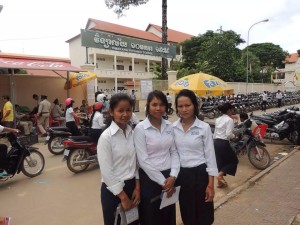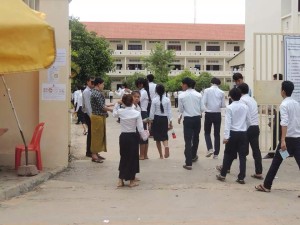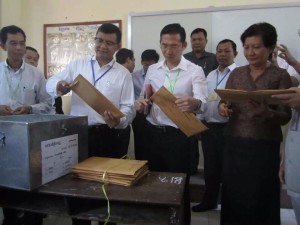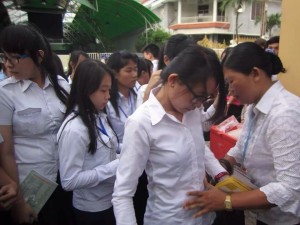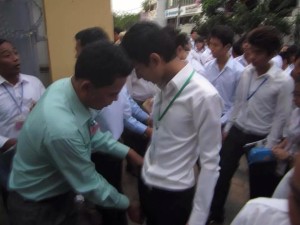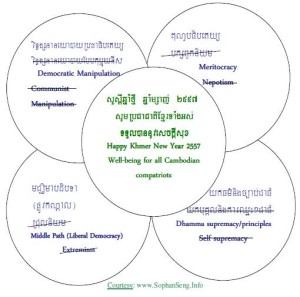Leadership in Education
now browsing by tag
Cambodia education exam policy and its irrelevance
“Through education, everything is possible”, this is a phrase I am daily heard at my work place as an employee at the Calgary Board of Education (CBE), a Western styled local education school board management. Each year, the board has produced huge market-oriented labors for this sprawling city and Canada country. Hence, their up-to-date curriculum and learning policy have been constantly revamped. At their first sentence for public opinion relating to curriculum adoption domain , the question is “How can curriculum remain relevant in an increasingly global and digital world?” to notify the public opinion to shape future of their children. Their education leadership is always posed at an outstanding performance as well.
Remarkably, the student success is not measured by their high score at final exam but by their assessment on effort (attendance), homework done and participation. All these are become accumulation of their yearly schooling scores. The school adopted competency-based education which measures student achievement through traditional on-site courses, online coursework, internships and paid employments, portfolios, and prior learning assessment (PLAs). This approach is the education diversification to welcome this new trend of economic diversification.
Regardless of relevant curriculum and outstanding leadership in education, the rampant corruption on K-12 exam each year is not yet resolved for Cambodia. The school exam bribery and cheating have been so pervasive in Cambodia.
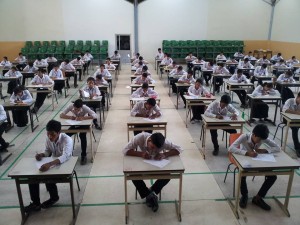 This 2014, thousands of Khmer students are entering into the exam rooms with different expectation of “no cheat, no exam leak, no corruption etc.” in according to the promise of new Education Minister, Dr. Hang Chuon Naron. But the lingering question is how could he achieve this mission in handling with human flaws of both his staffs and meager salary instructors? He also rejected the advise from NGOs on combining the exam scores with their two semesters schooling scores to decide student achievement, or at my understanding, this final exam is counted only 50% by allocating other 50% for students’ effort at school.
This 2014, thousands of Khmer students are entering into the exam rooms with different expectation of “no cheat, no exam leak, no corruption etc.” in according to the promise of new Education Minister, Dr. Hang Chuon Naron. But the lingering question is how could he achieve this mission in handling with human flaws of both his staffs and meager salary instructors? He also rejected the advise from NGOs on combining the exam scores with their two semesters schooling scores to decide student achievement, or at my understanding, this final exam is counted only 50% by allocating other 50% for students’ effort at school.
Lord Buddha said “Viriyena Dhukka Miccheti” or means “effort bring us success”. Civilized countries have adopted this theory completely by assessing students through their effort rather than through the few days strict test or exam.
All students are expected to pass the K-12 through their yearly schooling performance. The exam happened only through “entrance” which mean to enter into privilege universities or high required job positions etc. Why you judge Cambodian students’ competency through these few days strict exam? It is impossible to build pragmatic human resources for future Cambodia through strict exam. Myself and many friends have passed through this system at K-12 exam experience. We are sad on this continuing exam model. During my time, I was told the prospect of strict exam occurred on the reason of no chair (space) for university enrollment. Now, universities (both state and private) are mushrooming, the excuse of fearing no space for passed students to pursue their dream of higher education is not relevant any more.
By Sophoan Seng
Posted in Culture, Economics, Education, Leadership, Researches, Social | Comments Off on Cambodia education exam policy and its irrelevance
Tags: Leadership in Education
Political Leadership Message to Welcome Khmer New Year 2557
All Cambodians must be the catalyst of change!All Cambodians must be the agent of change!Change yourself – good luck!Change other – impossible!
I don’t think the strategy of “divide and conquer” would be applicable in our modern century. It possibly boomerangs!
Political leadership in Cambodia has been embedded by old style of communist manipulation, nepotism (no meritocracy), extremism and self or personal cult.
Abraham Kaplan said “politics is the redistribution of bandits.” Political scientist prof. Gergen said “a politician is a person who projects, motivates and rationalises the public for personal gain.” This manuscript is clearly illustrating the political game of “manipulations” but there is different between communist style of manipulation and democratic style of manipulation. While we are condemning KR of revolutionary communist, the arrival of Vietnamese’s regime is pure socialist communist. Both legacy and inheritance are still co-existing in Cambodian society nowadays.
For democratic-based manipulation, all games are educational and creating good heritage for younger generations. For communist-based manipulation, they can do whatsoever to defeat their contender(s) regardless of bad or unproductive outcomes. Within this prospect, Sam Rainsy who exercised his rights to protect Cambodia territory should not be criminalized. And the action should not be used to marginalize his political career. His absence is not good at all for Cambodia while this country is heading to develop democracy.
Posted in Culture, Education, Politics, Researches, Social | Comments Off on Political Leadership Message to Welcome Khmer New Year 2557
Tags: Happy Khmer New Year, leadership, Leadership in Education, liquid leadership, Political Culture, Political Leadership
Leadership in Education
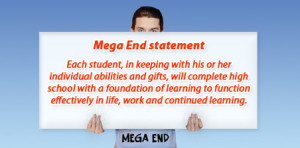 Contrasting to my personal experience in public education in Cambodia, I would like to dedicate this article to reflect on “leadership in education” in Cambodia with local management of Calgary Board of Education (CBE) for its 2010-2011 Mega-End Initiative.
Contrasting to my personal experience in public education in Cambodia, I would like to dedicate this article to reflect on “leadership in education” in Cambodia with local management of Calgary Board of Education (CBE) for its 2010-2011 Mega-End Initiative.
I was graduated grade 12 in 1993 in a school of downtown Siem Reap. As a son of farmer family in remote area, I struggled with all obstacles to realize my dream of “education education education”. While my favorite subject was Math, I was keen in Khmer and writing. However, like many other students, I had to learn from tutoring teachers at his private classroom focusing on Math, Biology, Chemistry and Physic. Academic learning was 99% covering in both classroom and private paid tutoring. In the schedule, there were few hours per week for Gym in which I rarely participated in the exercise training and it was frequently cancelled. All students required to fulfill all subjects in classroom such as Khmer, English, French, Literature, Mores, History, Geography, Philosophy, Math, Biology, Chemistry and Physic. These subjects are mandatory, no elective courses were offered. My teacher(s) directly delivered the course on his/her expert or training experience during my high school. I observe that I must remember those subjects like parroting to what teacher(s) said.
From my high school period of this 20 years, there have been little reforming on curriculum in Cambodia particularly on the level of compulsory public school education. In term of academic learning, I have seen some inserting new subjects such as social study and pure science into the existing curriculum.

For Calgary Board Education (CBE), it has updated its curriculum almost every year to substantiate its planned goal. For its 2010-2011, it reached a solution to implement a mega learning leadership by ratifying so-called “Mega-Ends” learning approach. Within that framework, academic learning success of students is just part of its goal for students to achieve Citizenship, Personal Development and Character. While Academic Success is the top of the foundation, Personal Development is the base, Citizenship and Character are the two essential wings.
On its instruction for Report Card to each student and parent about their semester learning success, teachers are advised:
Citizenship in learning:
- Exercises democratic rights and responsibilities within the learning community
- Demonstrates respect and appreciation for diversity
- Works and communicates effectively with others
Citizenship: Each student will be a responsible citizen by being an informed and involved member in his or her local, national and global communities.
Personal Development through learning:
- Sets and works towards learning goals
- Demonstrates confidence and autonomy in learning
Personal Development: Each student will acquire the skills, attitudes and knowledge to achieve personal highest potential.
Posted in Education, Social | Comments Off on Leadership in Education
Tags: leadership, Leadership in Education, liquid leadership












